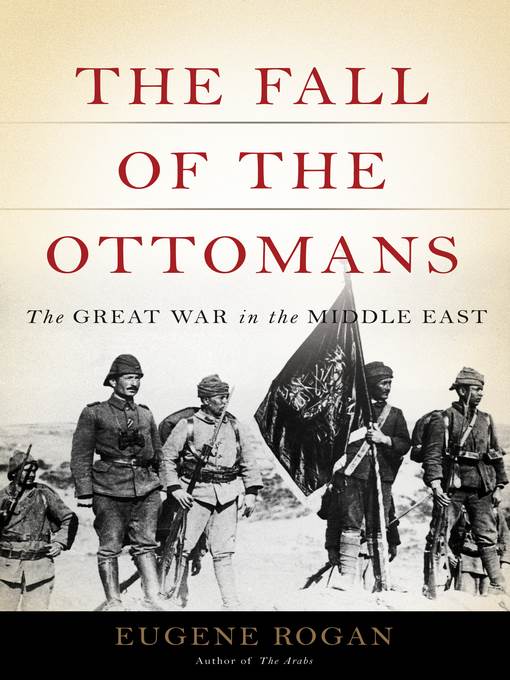
The Fall of the Ottomans
The Great War in the Middle East
کتاب های مرتبط
- اطلاعات
- نقد و بررسی
- دیدگاه کاربران
نقد و بررسی

January 19, 2015
Rogan (The Arabs: A History), a scholar of modern Middle Eastern history at Oxford, conducted extensive research in Ottoman Turkish and Arabic primary sources to remedy the lack of English-language WWI history from the Ottoman perspective. The result is a sweeping and nuanced work that shows how, in the years preceding the war, “the Ottoman Empire had endured a revolution, three major wars against foreign powers, and a number of internal disorders.” Ottoman forces were thus at a marked disadvantage when war broke out, which was compounded by hubris and poor planning: “The rush to take on two Great Powers with inadequate preparation condemned both campaigns to catastrophic failure.” Istanbul proved resilient, though, and it was only the Arab Revolt that precipitated the end of the Empire. Of the most contentious issue in latter-day Turkish history, Rogan says Ottoman documents “make a mockery of any attempt to deny the Young Turk government’s role in ordering and organizing the annihilation of the Ottoman Armenian community.” Though sections of the book are heavy on military strategy and tactics, Rogan’s multifaceted analysis touches on everything from the use of Islamist discourse in political movements to the treatment of minorities in the modern Middle East. Photos. Agent: George Lucas, InkWell Management

January 1, 2015
Rogan (Modern History of the Middle East/St. Antony's Coll., Oxford Univ.; The Arabs: A History, 2009, etc.) corrects Western assumptions about the "sick man of Europe."In this well-researched, evenhanded treatment of the Ottomans' role in World War I, especially in its assessment of the Armenian genocide of 1918, the author delineates the urgent internal and external causes spurring the crumbling Turkish empire to seek a defensive alliance with Germany and counter Britain, France and Russia when war broke out in 1914. The coalition of fiery Young Turks had risen against the aging autocratic sultan and demanded a restoration of the constitution in 1908, but during the tumult, they allowed Turkey's European neighbors to annex more territory. Russia's territorial ambitions were most feared, while Britain and France could not be trusted. The war became a "global call to arms" for all parties, with the Ottomans declaring a jihad in order to unite Muslims. Rogan walks through the "opening salvos" of the war, at Basra, Aden and Egypt, showing the vulnerability of the Ottoman defenses; yet the Ottomans showed enormous spirit and ingenuity against the Entente assault on the Dardanelles in February 1915. Rogan elucidates the Allied debacle at Gallipoli-although the lack of maps is frustrating-a reckless campaign he blames more on Lord Kitchener than on Winston Churchill and which provoked a government crisis back in Britain. The dire campaigns in Mesopotamia, Suez and Palestine were not a "sideshow" to be dismissed by the Allied planners in their hopes for a quick victory over a weak Ottoman Empire. Actually, they produced-through the Arab Revolt galvanized by T.E. Lawrence and the drafting of the Sykes-Picot Agreement and the Balfour Declaration-an uneasy armistice and partition that promised to be deeply divisive for another century. An illuminating work that offers new understanding to the troubled history of this key geopolitical region.
COPYRIGHT(2015) Kirkus Reviews, ALL RIGHTS RESERVED.

February 15, 2015
The Ottoman empire, dating back to 1299, quickly dissolved after the end of World War I, and there have been few works about its role in the Great War. The empire's most famous battle and victory, Gallipoli, is often told from the side of the British. Rogan (History, Oxford Univ.) aims to correct this. Beginning with the revolution of the "Young Turks" in 1908, his account chronicles the story of the Ottoman empire in World War I and its eventual collapse. The author contends that the entrance of the empire is what truly made World War I a "world" war. And the empire's sacrifices were great: 3,800 British died at Gallipoli while 14,000 Ottoman soldiers were killed. Rogan's work is even more pivotal because researching the Ottoman Army was not an easy task. Access to Turkish military archives is limited, and World War I is rarely memorialized in the Middle East. This well-researched and well-written book is not strictly military history, however, but an overview of the last years of the empire and its experiences in the Great War. VERDICT A much-needed addition to World War I scholarship that is recommended for anyone interested in that conflict and the history of the Middle East or Turkey.--Jason Martin, Stetson Univ. Lib., DeLand, FL
Copyright 2015 Library Journal, LLC Used with permission.

























دیدگاه کاربران